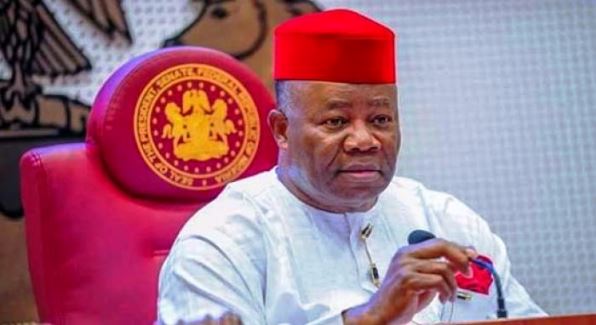The Nigerian Senate has amended the 2023 Appropriation Act to extend its implementation period from 31st March 2024 to 30th June 2024.
The Senate also re-enacted the Supplementary Appropriation Act 2023 to extend its implementation from 1st January 2024 to 30th June,2024.
The amendments, however, occurred after heated debates over the constitutional implications.
The amendment followed President Bola Tinubu’s request in a letter read by the Senate President Godswill Akpabio at plenary on Wednesday.
Tinubu’s letter titled: “Transmission of Appropriation Amendment Bill 2024 and Supplementary Appropriation Amendment Bill 2024 for consideration”, said it was pursuant to provisions of section 58 (2) of the constitution of the Federal Republic of Nigeria 1999 (as amended).
“I forward here with rhe Appropriation Amendment Bill 2024 for the kind consideration of the Senate. The Appropriation Amendment Bill 2024 seeks to amend the Appropriation Act 2023 to further extend the time for implementing the capital expenditures of the Appropriation Act 2023 from 31st March 2024 to 30th June 2024 while the Supplementary Appropriation Act 2024 seeks to amend the Supplementary Appropriation Act 2023 to extend it’s implementation period from 31st March 2024 to 30th June 2024.
“These extensions are necessary to ensure that the provisions of the Acts are exhaustively implemented”, he said.
It will be recalled that the Senate acted proactively, of their own a day earlier to extend implementation of the capital component of the 2023 Appropriation Act from 31st March 2024 to June 30, 2024.
ALSO READ Food security: ECOWAS trains 150 Anambra youths in fish farming
With Tinubu’s letter on Wednesday, the Senate was thrown into a heated debate on the right thing to do without infringing the constitution of the country.
The Senate Chief Whip, Ali Ndume (Borno South) said the clerk was in a better position to properly advise the legislators.
He said “What we are trying to do, it is better we do in a way we will not have constitutional complication. This is a supplementary bill. It could be the same document as 2024 supplementary Act so that it can be applied.
“I begin to think if it is legal, constitutionally to run several budgets at the same time. This supplementary budget, the Senate leader can present it as a bill in 2024.
In his contribution, the Deputy Senate President, Barau Jibrin, a former chairman of appropriation both in the House and in the Senate, said they were concern at all times to do things according to procedure to help the government.
“We are the ruling party, the president is ours. We must defend him by doing what is normal, what is in line with the procedure and practice of the legislature.
He said the letter sent by President Tinubu has solved the problem. “What we need to do now is to re-enact that expired Act as said by Senator Ndume. It is stated in the constitution that any appropriation bill or supplementary bill must be submitted to the National Assembly before we act on it. We can’t do it here; other bills can emanate from here, not appropriation bill. It must emanate from the presidency and he has done so”.
However, Senator Dankwabo (Gombe North), former Accountant General of the Federation and former governor of Gombe state observed that the Senate should not do something that will be in conflict with the constitution.
He said “the constitution stipulates that by June the account of the preceding year would have been audited and been reviewed by the Public Account Committee. You extended it to March, you still meet the constitutional 90 days. If you extend it to June, that means you will not submit the account until September, which contravenes the provision of the constitution.
“Secondly, you cannot extend the current, you can’t because you have already closed the books of account and provided for opening balance. That is why you have opening balance.
“In the Appropriation law you cannot say I’m paying salary of January and another January or the following year because you have another January in 2024. If you earned January 2023, it is already earned. We can go about it, but not in a provision like this.”
But Barau came again to draw his attention to section 81 (1) , (3, 4b) of the constitution to argue that the president can send appropriation bill or supplementary appropriation bill to the two chambers of the National Assembly at any time as the needs may arise.
He smartly played on semantics to say “what we are talking now is not an extension of that recurrent expenditure. It is a re-enactment, it is a new bill”.
After the debate, the Senate decided to play safe by re-enacting the Supplementary Appropriation Act to extend the implementation period to June 31, 2024.
The bill, which was read for the first time Wednesday, the Senate had to suspend its Rule 78 (1) to allow the bill to be read a second time.
The Senate then went into the Committee of Supply to consider it clause by clause and returned to plenary to pass it. This means the bill passed first reading, second reading and third reading the same day.
Jibrin Barau who presided at the time of the passage thanked his colleagues, particularly the Senate Leader, Opeyemi Bamidele for bringing the motion forward, even though the request came from the president.
He said it was necessary to have passed the bills so that the capital components of the 2023 Appropriation Act can be fully implemented, adding “there is no point passing budget, which is geared towards the development of our country and the most important component, the capital is unimplemented”.
Newsdiaryonline


